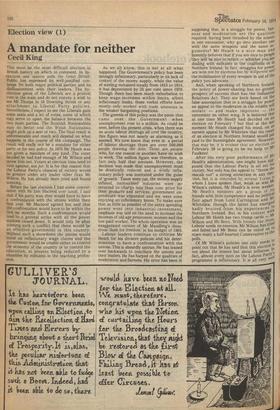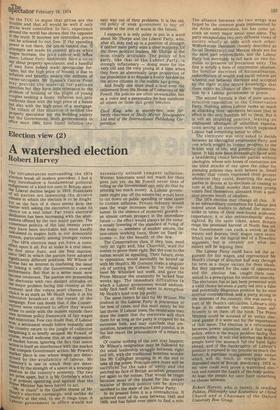Election view (1)
A mandate for neither
Cecil King
This must be the most difficult election in British history on which to comment. In byelections and opinion polls the Great British Public has expressed its well-justified contempt for both major political parties and its disillusionment with their leaders. The byelection gains of the Liberals are a protest vote in the main and do not convey a wish to see Mr Thorpe in 10 Downing Street or any attachment to Liberal Party policies. Nevertheless, I expect to see the Liberals gain some seats and a lot of votes, some of which may serve to upset the balance between the two main parties. The Scottish Nationalists may do better and the Welsh Nationalists might pick up a seat or two. The final result is unforeseeable and much will depend on what happens in the course of the campaign. The result will really not be a mandate for either party or for any policy. In 1970 Mr Heath was not given a mandate of any kind. The voter decided he had had enough of Mr Wilson and threw him out. Voters at election time tend to vote against, not for. It is for this reason that the Labour Party's chances of victory would be greater under any leader other than Mr Wilson. He has already been tried and found wanting.
Before the last election _I had some conversation with Mr lain Macleod over lunch. I said that if his party won they would have to have a confrontation with the unions within their first year. Mr Macleod agreed but said that the confrontation would have to be within the first six months. Such a confrontation would lead to a general strike with all the power stations closed down. It would only be after winning such a conflict that there would be an effective government in this country. Without such a showdown the unions would insist on inflationary wage claims and the government would be unable either to control the economy of the country or to control the education, at present being reduced to a shambles by militants in the teaching profession. As we all know, this is not at all what happened. The Government's policy has been strongly inflationary, particularly in its lack of control of the money supply, while the value of sterling remained steady from 1815 to 1914, it has depreciated by 25 per cent since 1970. Though there has been much exhortation to keep wage increases within limits, albeit inflationary limits, these verbal efforts have mostly only worked with trade unionists in the weaker bargaining positions.
The genesis of this policy was the panic that came over the Government when unemployment rose to a million. As could be seen, before the present crisis, when there was an acute labour shortage all over the country, this figure was not nearly as alarming as it seemed. We now know that even in a period of labour shortage there are over 500,000 people drawing the dole. These are people who, for one reason or another, have no wish to work. The million figure was therefore, in fact only half that amount. However, the decision was made that unemployment must be drastically reduced and a wildly inflationary policy was instituted under the guise of 'growth.' Taxes were cut, the money supply inflated, nationalised industries were in: structed to charge less than cost price for their products and services, government expenditure was expanded and we were soon enjoying an inflationary boom. To make sure that as little as possible of the extra spending power went into industrial investment, emphasis was laid on the need to increase the incomes of old age pensioners, women and the low-paid worker. The whole operation was an exaggerated version of Mr Maudling's disastrous 'dash for freedom' in his budget of 1963.
Labour leaders continue to criticise Mr Heath for his divisive policies and his determination to have a confrontation with the unions. This is absurdly untrue. He has leaned over backwards to conciliate the unions and their leaders. He has harped on the qualities of moderation and fairness. His error has been in
opecLatca February 16, 1974 supposing that, in a struggle for power, fairness and moderation are the qualities required. having been thrashed by the miners in one encounter, why go into another one with the same weapons and the same arguments? Mr Heath is a nice man and honestly believes that if you are nice to people they will be nice in return — whether you are dealing with militants in the coalfields or in Northern Ireland. In fact, struggles for power are won not by niceness but by willpower and the mobilisation of every weapon in aid of the policy you advocate. And, when speaking of Northern Ireland, the policy of power-sharing has no greater prospect of success than has the Industrial Relations Act. They are both based on the false assumption that in a struggle for power an appeal to the moderates in the middle Will isolate — and make impotent — the extremists on either wing. It is believed that at one time Mr Heath had decided on an election on February 7 but that at the last moment Mr Heath changed his mind, on an earnest appeal by Mr Whitelaw that the result of an election in Northern Ireland would put paid to the Sunningdale agreement. However, that may be, it is evident that an election 00 February 28 is going to be no help to Mr Faulkner. After the very poor performance of Mr Heath's administration, one might have OPposed that the Labour Party is all set for victory. Not only has, the appeal to "throw the rascals out" a strong attraction in any election, but it is conceded by several Tories t° whom I have spoken that, weak as was Mr Wilson's cabinet, Mr Heath's is even weaker* Mr Heath's ministers are a group of his, friends with little competence and no politica' flair apart from Lord Carrington and ivi 1 ,1. Whitelaw, though the latter has emerge., badly bruised from his experiences Northern Ireland. But in his contest Avt..t.'; Labour Mr Heath has two trump cards — Wilson and Mr Benn. With friends like the Labour needs no enemies. Mr Wilson has trieu and failed and Mr Berm can be relied on t° scare many a half-hearted Conservative to the polls. Of Mr Wilson's policies one only needs to point out that he has said that this election_,Is_ not about the miners but about inflation. 1,°, fact, almost every item on the Labour PartY programme is inflationary. It is all verY We for the TUC to argue that prices are the trouble and that all would be well if only Prices were controlled. In fact, experience around the world has shown that the opposite is the truth. If incomes are controlled, prices Can be allowed to run free. If the spending Power is not there, the prices cannot rise. If attempts are made to control prices while Wages increase, the price control will brnk dovvn. Labour Party spokesmen have a lot to say about property speculators, and a handful of men have indeed made spectacular for!Imes, but the high price of houses is due to Inflation and benefits mostly the millions of nvvner-occupiers. Mr Hyams's Centre Point may provide the material for partisan speeches but they have little relevance to the Problem of housing or the plight of young couples seeking a home. Inflation not only confronts them with the high price of a house but also with the high price of a mortgage. The villain of this situation is neither the Property speculator nor the building society but the Government. Both governments in Office since 1964, have found inflation the
easy way out of their problems. It is the old, old policy of weak government to buy off trouble at the cost of worse in the future.
I suppose it is only polite to put in a word about Mr Thorpe and the Liberal Party, who, after all, may end up in a position of strength if neither main party wins a clear majority. Of the three political leaders, Mr Thorpe is the most clearly articulate. The policy of his party, like that of the Labour Party, is strongly inflationary — doing more for the very old and the very young at a time when they form an abnormally large proportion of the population is to impose a heavy burden on the active citizens in the middle age group.
And finally one must shed a tear over the retirement from the House of Commons of Mr Powell. His policies are often unworkable, but as a voice and a personality he has outshone all others on those dull green benches.
Cecil King, who is seventy-two, was formerly chairman of Daily Mirror Newspapers Ltd and of the International Publishing Corporation.



































 Previous page
Previous page